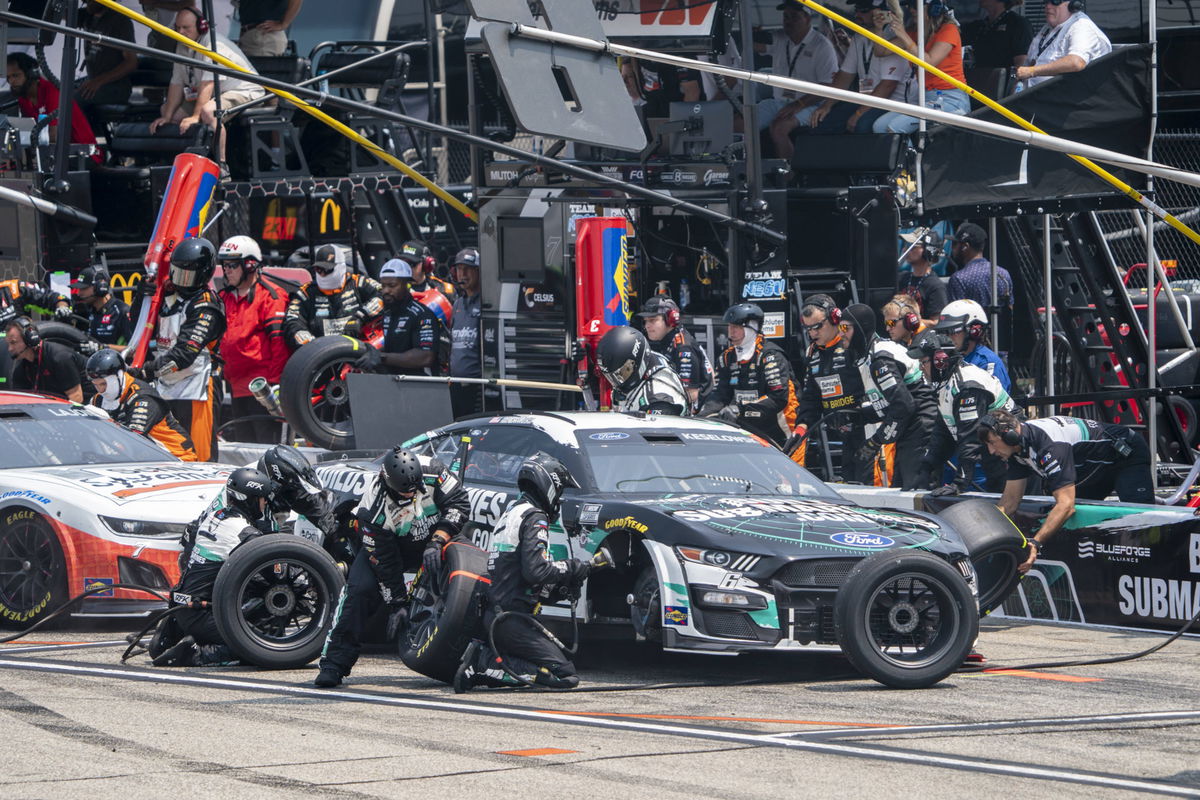
Imago
July 17, 2023, Loudon, NH, United States of America: NASCAR, Motorsport, USA Cup Driver Brad Keselowski 6 and crew make a pit stop for the Crayon 301 at the New Hampshire Motor Speedway in Loudon NH. Loudon United States of America – ZUMAa161 20230717_zaa_a161_009 Copyright: xWalterxG.xArcexSr.x

Imago
July 17, 2023, Loudon, NH, United States of America: NASCAR, Motorsport, USA Cup Driver Brad Keselowski 6 and crew make a pit stop for the Crayon 301 at the New Hampshire Motor Speedway in Loudon NH. Loudon United States of America – ZUMAa161 20230717_zaa_a161_009 Copyright: xWalterxG.xArcexSr.x
NASCAR has seen its share of tough calls when it comes to keeping the sport clean and safe. Back in May 2023, Derek Hartnagel, a truck chief for GMS Racing’s No. 43 team, found himself sidelined after violating the substance abuse policy. It’s a reminder of how seriously the sanctioning body takes these issues, much like when Jeremy Mayfield, a veteran with 433 Cup starts, got hit with an indefinite suspension in 2009 for methamphetamine use, derailing his career amid legal battles. But stories like these often have twists down the road.
Watch What’s Trending Now!
Hartnagel’s case echoes the challenges crew members face under strict rules designed to protect everyone in the garage. With time passed and requirements met, questions arise about second chances in racing. So what changed for this behind-the-scenes veteran two years later? Let’s find out.
Derek Hartnagel’s road back after NASCAR penalty
Derek Hartnagel’s suspension in 2023 was an indefinite one, referring Sections 4.1 and 10.1.A of the NASCAR Craftsman Truck Series Rule Book. Now, as insider Joseph Srigley reported on X, “#NASCAR says that Derek Hartnagel has been reinstated and is eligible to return to all NASCAR-related activities.” This marks a full circle after over two years away, highlighting how the policy allows for redemption through its Road to Recovery program.
#NASCAR says that Derek Hartnagel has been reinstated and is eligible to return to all NASCAR-related activities.
Hartnagel was suspended in May 2023 due to NASCAR’s Substance Abuse Policy, and at the time worked for GMS Racing.
— Joseph Srigley (@joe_srigley) September 5, 2025
Hartnagel, who had been part of teams like Empire Racing earlier, faced the same scrutiny as others in similar spots, where violations can stem from anything impacting safety or integrity. The scandal unfolded quietly compared to high-profile driver cases, but it underscored the policy’s reach to all members. Srigley added in his post, “Hartnagel was suspended in May 2023 due to NASCAR’s Substance Abuse Policy and at the time worked for GMS Racing.”
This ties back to a penalty report that week, which also included Chase Elliott‘s one-race ban for on-track conduct, where he wrecked Denny Hamlin intentionally, showing how NASCAR bundles behavioral issues. For Hartnagel, the ban meant stepping away from a role crucial to race prep, much like when Spencer Gallagher, a driver for GMS in 2018, got sidelined for a similar violation and had to complete counseling before returning. Now reinstated, Hartnagel can resume any NASCAR activities, opening doors to crew roles or other involvement.
As Srigley noted, he’s “eligible to return to all NASCAR-related activities,” signaling he’s cleared the plan set by the program administrator. This process, involving evaluation and treatment, mirrors Gallagher’s path, who returned after four months and later joined Xfinity. Hartnagel’s story adds to examples where compliance leads to forgiveness, emphasizing accountability over permanent exclusion.
While Hartnagel’s reinstatement shows the policy’s path to return, understanding what’s off-limits helps explain these decisions. Let’s look closer at the rules governing the garage.
NASCAR’s banned substances
NASCAR’s substance abuse policy casts a wide net to keep competition fair and safe, banning everything from illegal drugs to misused prescriptions. As ESPN outlined, “NASCAR prohibits the misuse of alcohol, prescription drugs, and any other substance used in a manner that affects safety or impacts the integrity of the competition, including, but not limited to, illegal or performance-enhancing substances.” This includes stimulants like amphetamine and methamphetamine, narcotics such as fentanyl and heroin, and even common items like ephedrine if taken improperly. The list aims to prevent any edge or risk, with alcohol barred 12 hours before activity at a 0.02% BAC threshold.
Testing is random and thorough, with consequences hitting hard for positives. ESPN explained, “If the substance abuse professional determines that the member has violated the policy, he or she will notify NASCAR of a positive test, and an indefinite suspension will be issued.” Violators must complete a Road to Recovery plan, including possible rehab, before reinstatement. This mirrors cases like Jeremy Mayfield‘s 2009 ban, where refusal to comply prolonged his absence, showing how non-cooperation can extend penalties.
The policy evolves but stays strict, with no public list of banned substances to avoid loopholes. ESPN noted, “NASCAR members are prohibited from using, having in their system, possessing, purchasing, selling, and/or participating in the distribution of any drug that is illegal to possess, use, and/or distribute by the laws of the United States of America and/or any of its 50 states, regardless of the amount, at any time.” This global standard protects against contaminated supplements, as seen in Shane Hmiel’s 2003 suspension for marijuana, which became a lifetime ban after repeats. For a truck chief like Hartnagel, it reinforces that everyone in the paddock faces the same accountability.








